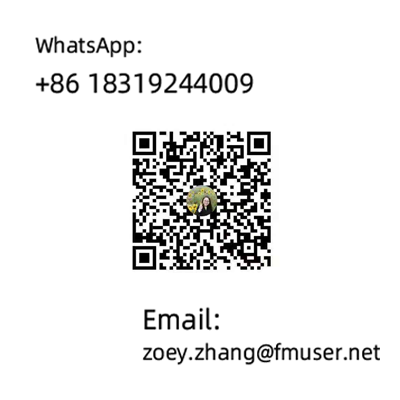Products Category
- FM Transmitter
- 0-50w 50w-1000w 2kw-10kw 10kw+
- TV Transmitter
- 0-50w 50-1kw 2kw-10kw
- FM Antenna
- TV Antenna
- Antenna Accessory
- Cable Connector Power Splitter Dummy Load
- RF Transistor
- Power Supply
- Audio Equipments
- DTV Front End Equipment
- Link System
- STL system Microwave Link system
- FM Radio
- Power Meter
- Other Products
- Special for Coronavirus
Products Tags
Fmuser Sites
- es.fmuser.net
- it.fmuser.net
- fr.fmuser.net
- de.fmuser.net
- af.fmuser.net ->Afrikaans
- sq.fmuser.net ->Albanian
- ar.fmuser.net ->Arabic
- hy.fmuser.net ->Armenian
- az.fmuser.net ->Azerbaijani
- eu.fmuser.net ->Basque
- be.fmuser.net ->Belarusian
- bg.fmuser.net ->Bulgarian
- ca.fmuser.net ->Catalan
- zh-CN.fmuser.net ->Chinese (Simplified)
- zh-TW.fmuser.net ->Chinese (Traditional)
- hr.fmuser.net ->Croatian
- cs.fmuser.net ->Czech
- da.fmuser.net ->Danish
- nl.fmuser.net ->Dutch
- et.fmuser.net ->Estonian
- tl.fmuser.net ->Filipino
- fi.fmuser.net ->Finnish
- fr.fmuser.net ->French
- gl.fmuser.net ->Galician
- ka.fmuser.net ->Georgian
- de.fmuser.net ->German
- el.fmuser.net ->Greek
- ht.fmuser.net ->Haitian Creole
- iw.fmuser.net ->Hebrew
- hi.fmuser.net ->Hindi
- hu.fmuser.net ->Hungarian
- is.fmuser.net ->Icelandic
- id.fmuser.net ->Indonesian
- ga.fmuser.net ->Irish
- it.fmuser.net ->Italian
- ja.fmuser.net ->Japanese
- ko.fmuser.net ->Korean
- lv.fmuser.net ->Latvian
- lt.fmuser.net ->Lithuanian
- mk.fmuser.net ->Macedonian
- ms.fmuser.net ->Malay
- mt.fmuser.net ->Maltese
- no.fmuser.net ->Norwegian
- fa.fmuser.net ->Persian
- pl.fmuser.net ->Polish
- pt.fmuser.net ->Portuguese
- ro.fmuser.net ->Romanian
- ru.fmuser.net ->Russian
- sr.fmuser.net ->Serbian
- sk.fmuser.net ->Slovak
- sl.fmuser.net ->Slovenian
- es.fmuser.net ->Spanish
- sw.fmuser.net ->Swahili
- sv.fmuser.net ->Swedish
- th.fmuser.net ->Thai
- tr.fmuser.net ->Turkish
- uk.fmuser.net ->Ukrainian
- ur.fmuser.net ->Urdu
- vi.fmuser.net ->Vietnamese
- cy.fmuser.net ->Welsh
- yi.fmuser.net ->Yiddish
How to Start an FM Commercial Radio Station
Radio is a finite resource. In a given area, there are only so many available frequencies for transmitting FM signals. To start a station, you must have a license to broadcast on a specific frequency. As part of getting a license you have to find an available frequency for broadcasting your own station. Even if you find one, there's no guarantee you'll be able to buy it.
One of the papers you have to file with the FCC is a construction permit for your new station. You must choose a location where you can broadcast an acceptably powerful signal over the community covered by your license. The location has to be physically practical -- not in the middle of a river, for instance -- and conform to any local environmental or land use restrictions. If you pick an unsuitable location, you're out the $3,485 application fee.
Once you select a tentative site for your station, enter the longitude and latitude into the FCC's FM allotment finder. This launches a search of the FCC's database to find out whether there's an open Class A frequency at that location you could use. Class A is the lowest-power commercial station, covering the smallest broadcast area with its signal. If you can't find an open frequency, there's no way you can open a new commercial station.
Once you have your frequency allotment and location picked out, submit Forms 301 and 159 to the FCC along with the filing fee. You also submit a petition for rulemaking to the office of the FCC secretary. The petition identifies the community where you want to broadcast and whether you want a Class A radio station or a different class. The petition also shows that the allotment meets FCC requirements for spacing between your frequency and other stations and station applications.
You can't just buy a frequency for your station, you have to win it in an online auction. If the FCC approves your petition, it will put the frequency allotment up for bid in a future auction. The FCC usually auctions off several frequencies at once, taking from a day to several weeks. If yours is the winning bid, the FCC will tell you the down payment for the license. You have 10 days to submit the money along with all the required paperwork.
You'll need a station building to house your transmitter, business offices and radio studio. Unless you can remodel an existing building, you'll have to build one. Then you have to buy equipment, including a transmitter, a broadcast antenna and generators. If you can find an existing broadcast tower with space to rent, you can install your antenna there. Otherwise, you'll have to build your own tower. Then you must find programming such as local news or music to fill airtime. Record labels are usually willing to provide music, but you have to pay licensing fees. Some of your airtime will have to go to ads -- selling commercials is where most stations make their money.





